Updated 15 February 2021 at 11:38 IST
NASA's Mars rover Perseverance faces 'terror' before landing on the surface
NASA's Mars rover Perseverance is all set to land on the surface of the Red Planet later this week after completing more than seven months of grueling journey.
- World News
- 2 min read

NASA's Mars rover Perseverance is all set to land on the surface of the Red Planet later this week after completing more than seven months of grueling journey in deep space. The rover will touch down the surface of Mars after entering the Red Planet's atmosphere, but before that it will send a radio transmission to a NASA team back on Earth, monitoring the journey of the space capsule. The transmission from Mars takes at least 11 minutes to reach mission managers on Earth, but the full descend of Perseverance from the top of the atmosphere to the Martian surface will take only 7 minutes, which scientists refer to as "seven minutes of terror".
The Perseverance rover will already have landed on the surface of Mars, before the radio transmission could get back to mission managers on Earth, some 204 million kilometres away. So, scientists will get to know about the mission's success only after four minutes of its completion. Perseverance, which has an onboard laboratory to conduct various tests, will land on the surface of Mars on February 18.
Advertisement
Perseverance rover will be released from the capsule some few hundred kilometres above the Martian surface following which it will start making descend with the help of the Lander Vision System (LVS). LVS is equipped with navigation and other features to make the landing for Perseverance as smooth as possible because of the tricky terrain on Mars.
Advertisement
What will Perseverance do?
NASA's Mars probe was launched in July 2020 during last year's window for launch to the Red Planet. Perseverance, a six-wheeled robotic geologist, will search Jezero Crater after landing on the Martian surface for signs of ancient life and collect samples that will eventually be returned to Earth. NASA says Jezero Crater is the perfect place to search for signs of ancient microbial life because billions of years ago, the now-bone-dry 45-kilometre-wide basin was home to an actively-forming river delta and lake filled with water.
Published By : Vishal Tiwari
Published On: 15 February 2021 at 11:38 IST
